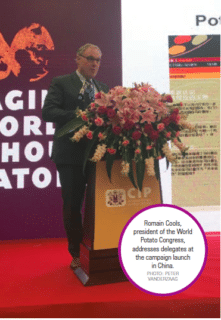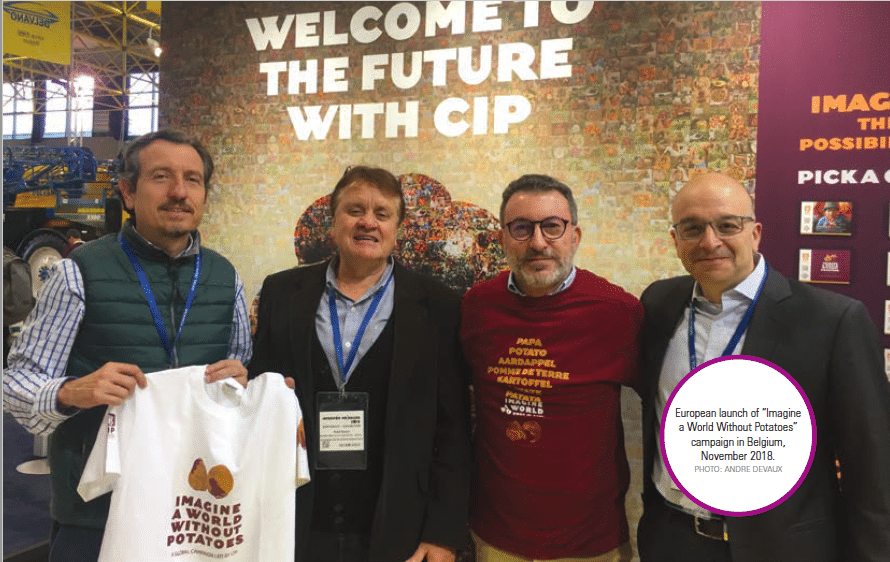[deck]CIP’s campaign is inspiring the world about potatoes.[/deck]
IN SOME REGIONS of the world potato consumption has stagnated in recent years. There are several thorny reasons for that, says Peter VanderZaag, president of Sunrise Potato Storage in Alliston, Ont., and a professor at Yunnan Normal University in Kunming, Yunnan Province, People’s Republic of China.
“In the media, potatoes get a bad rap in many ways,” he asserts. “There is lots of information out there about how they are fattening, they are high-carbohydrate, they don’t have a lot of nutrients.”
To combat the worldwide decline in potato consumption, it makes sense to take a worldwide focus. That’s the view of leadership at the International Potato Center (CIP), which launched a global awareness campaign in May 2018 at the 10th World Potato Congress.
The initiative is called “Imagine a World Without Potatoes,” and it “invites millions of potato consumers around the world to imagine life without the potatoes they are so used to having around them in all their varieties and presentations.”
At the launch, Barbara Wells, CIP’s director general, said the campaign is intended “to raise awareness of the incredible biodiversity of potato and how it can offer solutions to the global challenges we are facing such as climate change, food security and development.” She added that “to safeguard the future of potato, we need to continue supporting efforts to maximize the crop’s potential, boosting production, encouraging scientific research and promoting consumption.”
The problem is not that potato fails to inspire, said Marc de Beaufort, CIP marketing specialist, “but that we take it for granted.”

One Message, A Thousand Voices
To be a success, “Imagine a World Without Potatoes” seeks to bring together diverse partners across the global potato sector: private companies, trade associations, public research institutes and more.
Each campaign partner is free to develop their own strategy with the campaign materials and messages, from including the logo on product packaging to events and social media use. The idea is that many different institutions and players around the world employ their existing marketing power — and their creativity — to help convey the central message. Creative ideas might include, suggests CIP, packing popular potato products in black wrappings for a period of time in grocery stores, competitions involving videos portraying life without potatoes, and planting potato gardens at schools.
CIP notes that similar types of campaigns have shown success. For example, in Columbia in 2014 after 50 years of conflict, negotiations were going on between the government and left-wing guerrillas. To promote the peace process, over 200 companies, sports clubs, universities and religious organizations took part in the “Soy Capaz” (I Can) campaign.
During this initiative, partners used the colour white in the packaging of their most popular products and different variations of the phrase “as a message that expressed the need for society to take part in the complex process of peace building.” It worked, helping boost the process by unifying Columbians behind it.
Cost and Regional Reports
To take part and support its campaign, CIP asks partners to provide USD $5,000. This is used to cover the creation of marketing materials and also current operational costs, which includes CIP actively sharing each partners’ events and other activities on several digital platforms. Also included in the fee is an initial meeting with the campaign director to discuss possible needs and go over examples of how the campaign is being applied by others.
CIP says having globally posed the question of what the world would be like without potatoes, “we will have laid the groundwork to make consumers more receptive to the many educational campaigns that promote the qualities of the potato.”
Once their curiosity about the potential of the potato has been raised, CIP believes “they will be more receptive to the messaging led by the private sector and potato associations around the world that explain the potato’s nutritional and economic benefits.”
The importance of potatoes in helping feed 10 billion people by 2050 was discussed at the European launch of the CIP campaign in Belgium in November 2018. Campaign creator Andre Devaux, who was CIP’s Latin American regional program director and now is an international advisor at the World Potato Congress, gave a presentation emphasizing how important partnerships are (among research institutes, private industry, governments and NGOs) in potato promotion.
Devaux also highlighted CIP’s efforts to produce more nutritious potatoes and develop new potato products, and stated that “huge progress” has been made in developing better-adapted and more resilient potatoes in different regions of the world (for example, the Kinigi variety in Rwanda).
VanderZaag echoes the sentiment that potatoes will be important in future global food security.
“No crop produces more protein — potatoes have all the essential amino acids except two — and out-yields corn, wheat and rice per unit of area, time and water,” he says. “As land becomes more scarce and water availability becomes more of an issue, the potato will grow in significance.”
VanderZaag traveled to China last year to attend the launch of the CIP campaign in Asia, and says China is currently the largest potato producer on the planet. “People in the mountains there, if you asked them to picture a world without potatoes, they would say it’s completely impossible, just as they would say the same in countries like Peru and Ecuador. But if you go to cities like Shanghai or Beijing, it’s a more diversified diet.”
He reports that to support Chinese farmers in the mountains to have a stable, good income and to boost potato consumption, China’s president is now decreeing that potatoes have to be present on menus in cafeterias and other locations. There is also a new potato recipe book that’s been released in China, VanderZaag says, adding the government is also discussing making potatoes an official food of the Winter Olympics in 2022, which will be held in China.
Here in Canada, the campaign has yet to begin, says United Potato Growers of Canada general manager, Kevin MacIsaac. The first time he learned about the initiative was at a meeting in late 2017 in Prince Edward Island. “We had lots of questions and needed some time to think about the opportunity,” he says. “I would say the next big step was seeing the [campaign] booth in Peru at the World Potato Congress. [We] agreed to turn the project over to the National Marketing Committee of the Canadian Potato Council.”
In late January 2019, MacIsaac says there was a conference call to determine which provinces might be interested in moving forward with becoming part of the campaign. De Beaufort was on that call.
“I was impressed when de Beaufort said they now have 60 partners in 60 countries,” says MacIsaac. “Many of these are major worldwide companies like McCain, Pepsico and Bayer, and also some industry support organizations like Belgapom. We were a little surprised that the U.S. has not really signed on yet. Our next step in Canada is to see who wants to put up the $5,000 membership fee to move forward.”











